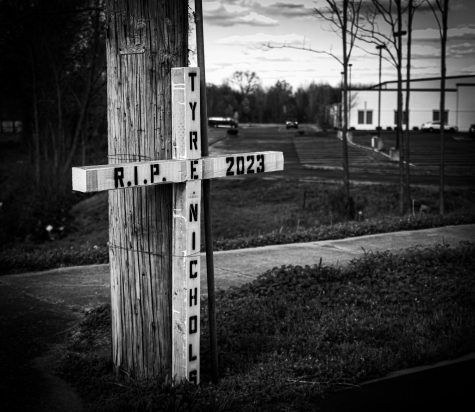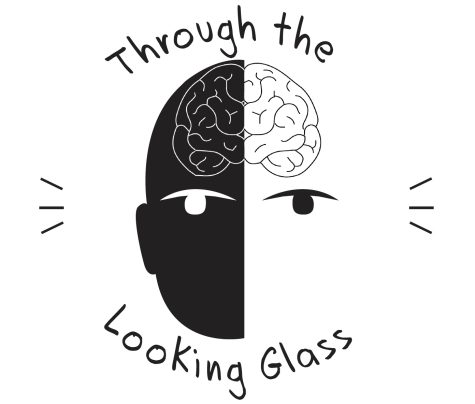Coming out of the darkness
Struggle with body shame, depression inspires a student’s activism
Photo: Elle Vaughn
Junior Anna Harbert is a typical girl trying to get through high school. She cheers, loves animals and is active in her youth group. Her laugh is infectious, and she is generally a pretty happy person – except when her depression hits her, but that’s not too often.
This was not always the case. Harbert suffered from feelings of depression, self-harm and an eating disorder during middle school and high school.
It all began in the sixth grade.
“I felt like I didn’t fit in. I had weight issues in elementary school going into middle school. I also struggled with my friend group because I had a lot of paranoia, wondering if they [were] talking about me or making fun of me,” Harbert said. “I always felt that way because I dealt with bullying in elementary school.”
Her feelings took her to dark places, affecting her everyday life.
“Honestly what depression feels like is a big cloud over your head, and it feels like something is never going to go away,” Harbert said. “The problems are taking over your life, and you can’t look at the positives. It just feels like something is always dragging you down, and you can’t escape it. It’s just insane.”
According to reports from the National Institute of Mental Health, 12.5 percent of teenagers ages 12 to 17 had some symptoms of depression in 2015.
Harbert did not realize the severity of her depressed feelings until she was in the eighth grade. By then, she had been self-harming and suffering from disordered eating for over three years.
“I finally just spoke up,” she said. “I was way too nervous to tell my mom anything, though. We were at a doctor’s appointment, and I said, ‘Something’s not right with me. I’ve been self harming for [years] now, and I know it’s not normal. I really need help.’”
Harbert’s parents took heed and sought out help from Lakeside Behavioral Health System, a behavioral health care and addiction center in Memphis. Harbert had her doubts about the recovery program, at first, but she attempted to remain positive.
“When I was in Lakeside, I felt very lost. I was kind of scared because I felt like only crazy people went there,” she said. “They literally gave me a list of coping skills, which I had never thought about before. In the moment, I knew that I wanted to do this. I knew it could help.”
Lakeside Behavioral Health System and Daybreak Treatment Centers are two of many treatment centers in Memphis that work with young people struggling with such issues.
Ms. Susie Gregory, Daybreak Treatment Center’s Director of Admissions, has first-hand experience with students like Harbert, as she meets families and assesses the cases of those who enter the program.
“We at Daybreak definitely see spurts in the children that enter our program, where their emotional state and mood state are keeping them from living a healthy life. Children usually are potential candidates if they appear to be school-avoidant, depressed, suffering from anxiety, experimenting with alcohol and marijuana or harming themselves,” Ms. Gregory said.
“When we body-shame and bully each other, we open a big, black hole, and we see a lot of kids here because bullying has rocked their lives.”
After spending more time at Lakeside, Harbert felt as if it helped her make new friends and connect with her parents over her struggles during her recovery.
“Through that whole experience, I made a lot of good friends, and they kind of helped me through it,” Harbert said. “The outpatient therapy really helped out because they had parent nights, where my mom and dad could understand where I was coming from and what I was actually going through. It really did help, and it’s honestly the best feeling to say I have my parents’ full support.”
It’s hard to escape the pressures that society places on our bodies, particularly when it’s so easy to internalize those pressures. In this day and age, social media is one of the key triggers of negative body image, as teens may feel that they do not measure up to certain goals in front of them or may feel distressed by harsh comments from others.
The consequences of body shame – disordered eating, anxiety, depression, self-harming behaviors and even substance abuse – are especially a concern for teens and young adults, like Harbert.
“Our job is to teach kids not to have thinking mistakes, learn to think about their bodies correctly, empowering kids to maintain their body image,” Ms. Gregory said. “Body image doesn’t exist in a vacuum.”
Since treatment, Harbert has come to accept herself for who she is and has gained a more positive outlook on her depression.
“I feel like I have finally accepted things like my body shape, and I’ve been able to have a better mindset. I’ve been able to be more optimistic through therapy and just understanding that my mind is going to go a little bit crazy sometimes, and I’m not alone,” Harbert said. “I used my mental illness and my experiences to just throw myself out there because I want to help as much as possible.”
Harbert’s recovery experience even inspired her to craft her Senior Independent Study around suicide awareness. She plans on working closely with the American Foundation for Suicide Prevention to help create bills that address mental illness and to share her experience with others.
“My whole point of my SIS is to really stress that these are ordinary people,” Harbert said. “They have lives. They’re not sad all the time. You don’t know because people don’t want to share that, [and] they know that they may get judged because of it.”
Harbert’s mother, Mrs. Kim Harbert, fully supports Anna’s decision to share her story with other people and believes that mental health, amongst other arising issues today, should not be ignored.
“We feel the more that Anna can speak out, the more that it empowers her that the disease is not going to defeat her. We don’t know if it means that she’s to help someone else through a tough situation by her identifying and telling people her story, but we certainly feel that it is not something that we are ashamed about. We were a typical, normal family, and if it can happen within our family, then it can certainly happen anywhere,” Mrs. Harbert said. “Mental health is something that I think our country is going to have to address because there’s more and more issues that are popping up, and I think that people are hurting and suffering. If Anna’s story can help one person, then, absolutely, we’re all for it.”
Harbert stresses that rebuilding a healthy body image takes time, but in the end, one has to realize that “the ideal body” standards are pointless.
“People have to understand that everyone is unique,” Harbert said. “Honestly, you just have to be comfortable within your own skin.”
If you or someone you know is struggling with feelings of depression or an eating disorders, call the National Suicide Prevention Hotline at 1-800-273-8255 (https://suicidepreventionlifeline.org/), the National Eating Disorders Association at 1-800-931-2237 (https://www.nationaleatingdisorders.org/) or visit a local behavioral center.
Daybreak Treatment Center
Phone: 901-753-4300
Lakeside Behavioral Health System
Phone: 901-377-4700
Elizabeth Bran, Upper School Director of Counseling and Guidance
Phone: 901-457-2012
Email: [email protected]
Amy Michalak, Middle School Director of Counseling and Guidance
Phone: 901-457-2129
Email: [email protected]












